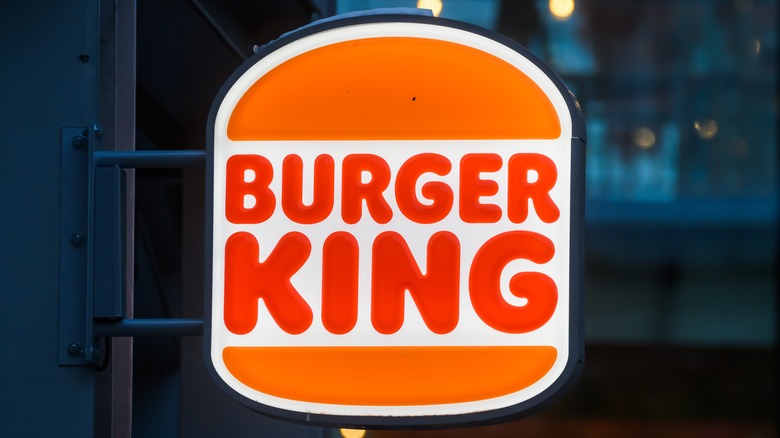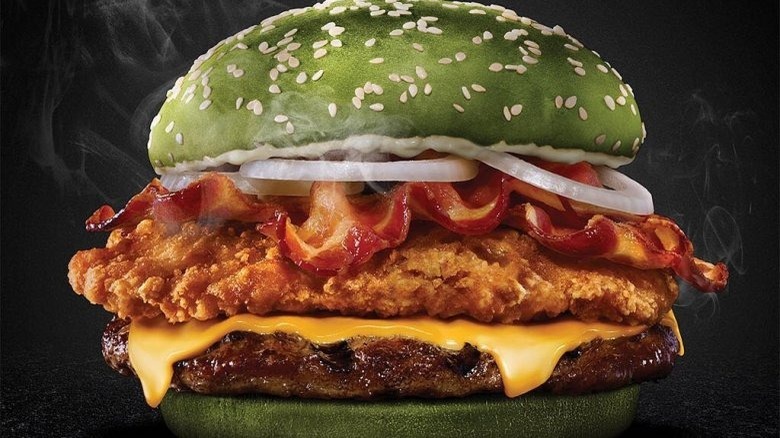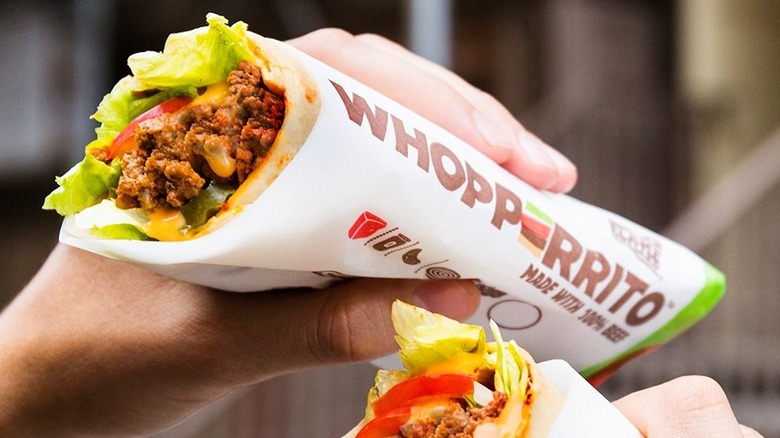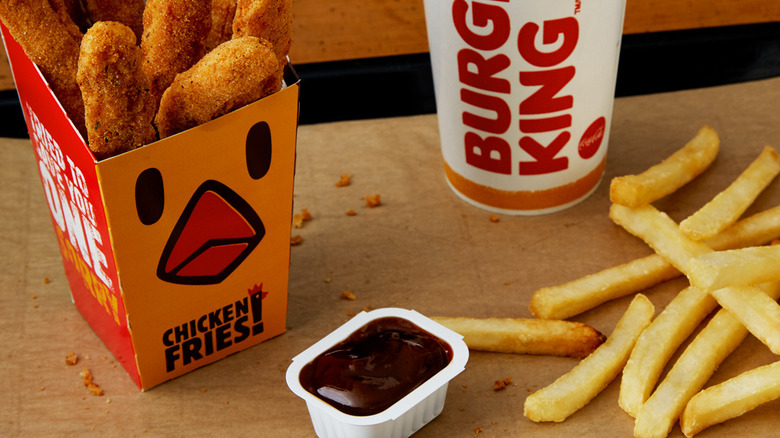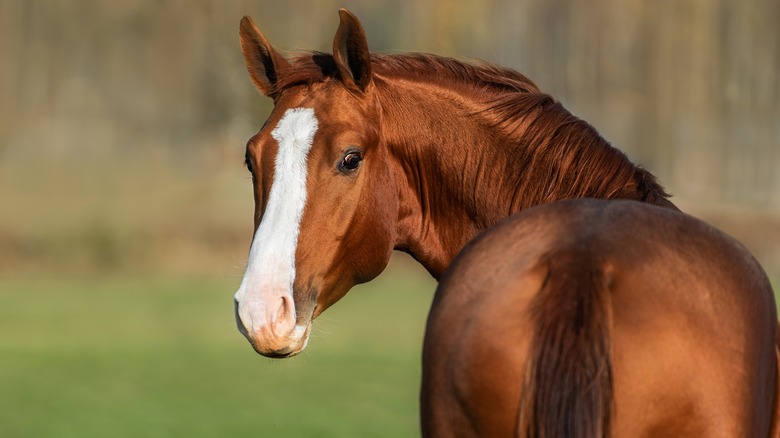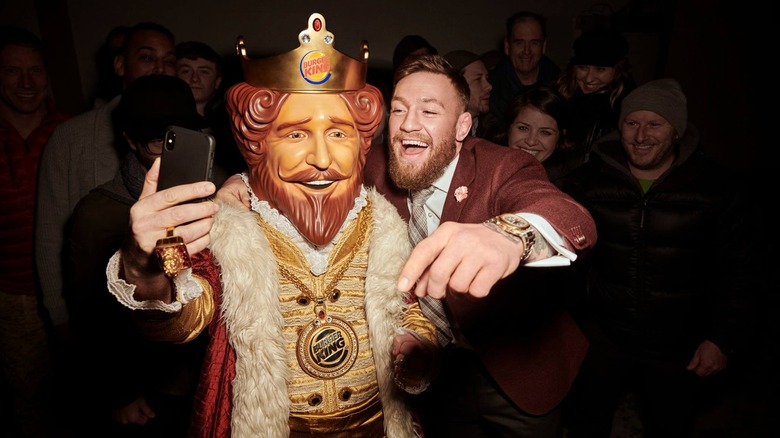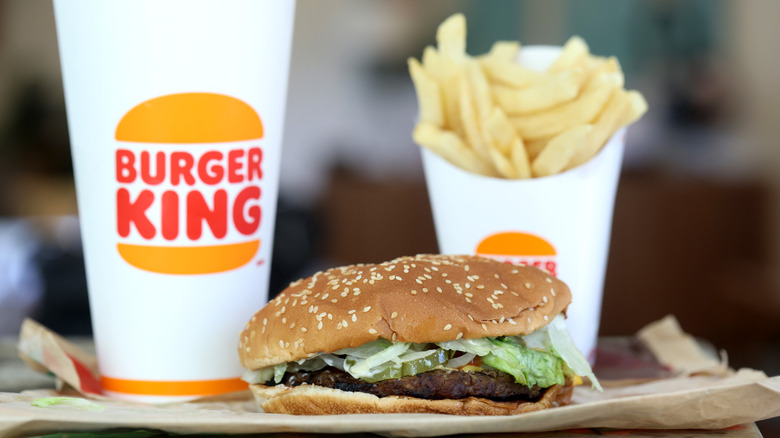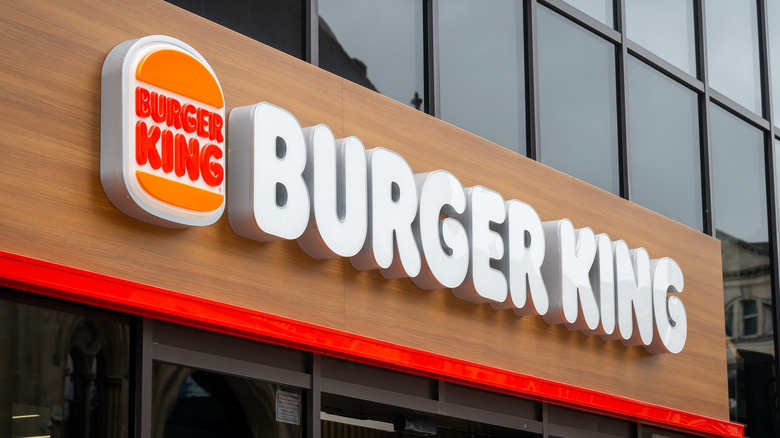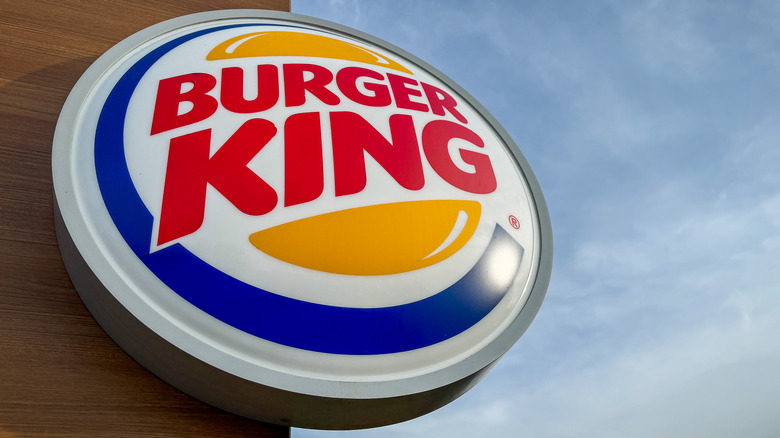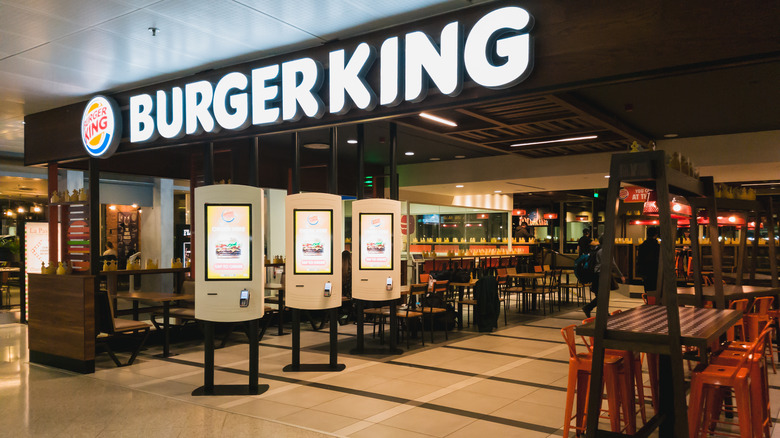What Burger King Doesn't Want You To Know
When it comes to having skeletons in the closet, fast food restaurants always seem to be well stocked. Whether it's the embarrassing lawsuit that made the board of directors cringe or a long-forgotten menu item that was doomed from the start, there are always things that restaurants would like you to forget. But with life in the age of the internet, information is only a click away, so it has become a bit harder to ignore some embarrassing or even diabolical blunders made by fast food restaurants like Burger King.
Burger King was initially founded in 1953 by Keith J. Cramer and Matthew Burns. The company was known as Insta-Burger King and it was directly inspired by McDonald's. A year later, David Edgerton and James McLamore opened an Insta-Burger King franchise in Miami, Florida. By 1959, Edgerton and McLamore purchased the rights to the company and took control of what became Burger King. 65 years later, Burger King has become one of the world's biggest fast food restaurants, with nearly 19,000 stores across the globe. With that much exposure, it makes perfect sense that Burger King has gone through some cringe-worthy scandals. Here are some of the worst things that Burger King doesn't want you to know.
Halloween ushered in a different kind of nightmare
In 2015, Burger King decided to take a stab at creating its own Halloween-themed treat when it released a special edition Halloween Whopper. The burger featured a bun that was dyed black to give the sandwich that moody Gothic appearance. There was just one downside. Customers who ate the Halloween Whopper reported that their bowel movements turned neon green. While there weren't any health concerns to go alongside the weird number two hue, Burger King certainly hoped customers forgot all about the strange side effect when it introduced another Halloween sandwich three years later.
In 2018, Burger King released the Nightmare King. The sandwich was packed with a quarter pound of beef, a crispy chicken filet, and a slab of bacon. The sesame seed bun was then tinted green to create a ghoulish effect. If that wasn't enough to entice the average hungry American, Burger King also claimed that the burger was designed to encourage nightmares in whoever consumed it. The veracity of that claim is up for debate, but either way, some Reddit users were still left underwhelmed by the Nightmare King. "This burger looks kind of gross to me," noted one Redditor. "I don't know why, none of the ingredients individually are bad but combined together like that it just doesn't seem appetizing."
Burger King's Whopperito is the forgotten stepchild of the family
When you're looking for a delicious and portable menu item to eat on the go, the classic burrito usually checks all the boxes. So it made sense when Burger King decided to try its hand at offering a burrito of its very own. After initially starting out as a trial run in Hermitage, Pennsylvania, the Whopperito became nationally available in August 2016. Unfortunately for the fast food burger chain, burrito success was just out of the King's reach. Despite the initial buzz about the hamburger and burrito hybrid, the Whopperito failed to live up to expectations. Just a few months after its release, the Whopperito vanished from the menu.
Ultimately, the Whopperito disappointed some people. One Reddit user documented their experience trying the Whopperito. "Yeah. I don't honestly expect it to look like the promo, but the picture isn't lying here, everything was just near colorless blech. Still ate it though ... needed that nighttime snack," the user wrote. Unfortunately for Burger King, people stopped buying the Whopperito when the novelty of the menu item wore off. Even with the lukewarm reception, some fans remained dedicated to the creation. In 2021, one dedicated Whopperito fan started a Change.org petition to bring back their favorite short-lived menu item. But there hasn't been any indication that Burger King wishes to bring back its flash-in-the-pan offering.
Burger King lost a fortune thanks to a computer error
Most promotions are designed to drum up business and get people interested in visiting a store nearest to them. After all, who doesn't love a good deal? But in 2019, a simple computer glitch cost one Burger King franchisee millions of dollars when its own promotion saw an unforeseen side effect. Carrols Restaurant Group, which owns 1,000 Burger King locations, accidentally allowed customers to double up on coupons while ordering Whoppers.
While offering its two Whopper Jr. sandwiches for $4, two Whoppers for $5, and two Double Whoppers for $6 deals, the restaurants were supposed to sell fries and drinks at regular menu prices. Instead, customers received the additional items at discounted prices on top of the already discounted sandwich deals. Though it was a welcomed surprise for customers, the franchisee took a massive financial hit. Carrols Restaurant Group estimated a loss of $1.50 per order, which resulted in a decrease of over $12 million in sales over a three-month stretch. Carrols Restaurant Group CEO Dan Accordino bluntly summarized the company's mistake. "We screwed up and it cost us a fair amount of money," Accordino told the Syracuse Post Standard.
A slip and fall cost a king's ransom
Accidents happen. From spilled milk to a dropped egg or two, accidents will always occur at some point. It's just human nature. However, not all accidents are created equal. In fact, some accidents can be exponentially more costly than others. One Burger King franchise in Florida knows that all too well.
In 2019, Richard Tulecki suffered substantial injuries when he slipped on something wet and fell inside a Burger King bathroom in Hollywood, Florida. The injuries were so severe that Tulecki required surgery, which left him with a perforated colon. Ultimately, Tulecki's condition prevented him from working. After consulting a lawyer, Tulecki sued the Burger King franchisee, Seven Restaurants. Following the trial, a jury awarded Tulecki nearly $8 million in damages.
In a press release, Tulecki's lawyers H Ross Zelnick and Miguel A. Amador argued that Tulecki's win would help pay for his medical expenses: "Our client suffered tremendous hardship due to the Defendant's negligence. While no verdict could undo those damages, it will provide him and his family with the resources to move forward."
Burger King made light of car crashes
In 2018, Burger King developed a marketing campaign that was a direct hit with some and a complete miss with others. "Leave It To Us” was the name of an internet campaign designed to encourage customers to use Burger King's food delivery partner, DoorDash. The campaign featured photos of real-life incidents in which cars crashed into Burger King locations around the United States.
Burger King's social media team decided to use the destructive automobile accident photos as a chance to work out their tongue-in-cheek comedy chops. The team used phrases such as "don't drive hungry" and "safety first" in its posts (via Today). The campaign never featured any accidents with casualties, but many of the photos included fairly destructive collisions that resulted in significant damage to the Burger King locations. Public reaction was mixed on the campaign and Burger King never featured the advertising concept again. But that doesn't mean that the Burger King-related auto accidents stopped. In 2023, an Ohio Burger King was struck by a vehicle, injuring one employee.
Burger King was nearly sued by Slipknot
Imitation may be the sincerest form of flattery, but that doesn't always mean it's a good thing. In 2005, the nu-metal band Slipknot took offense to one particular Burger King ad campaign that featured a strikingly similar metal band called Coq Roq. The ad featured Coq Roq band members dressed up in attire that closely resembled Slipknot, even with their very own masks. If you're familiar with Slipknot, then you'd know that the band's aesthetic is pretty far from family-friendly marketing material. But there was a twist. Coq Roq sported masks that closely resembled chickens in a bid to promote Burger King's chicken fries.
Coq Roq was the brainchild of creative director Tom Zukoski, who claims that the campaign resulted in Chicken Fries becoming one of Burger King's most successful product launches in company history. Despite the clucking differences between the bands, Slipknot filed a cease and desist letter to Burger King, claiming that Coq Roq ripped off their band's signature look. After releasing just four songs, Coq Roq picked up their belongings and headed back to the chicken coop, never to be heard from again. But who knows, maybe the chicken band will cross the road once again.
Trading in friends for food
Would you ever sacrifice someone you love in order to survive? It sounds like a very dramatic question, but in 2009, Burger King asked its most loyal fans that very same thing. Okay, maybe it wasn't exactly a life-or-death situation, but the fast food chain did ask its most loyal fans to make a brutal sacrifice. Thinking outside of the box, Burger King introduced a brand new promotion called the Whopper Sacrifice. The concept was simple. Fans just needed to unfriend 10 people on Facebook to receive a free Whopper. And just to make things even more interesting, Burger King notified the poor souls who were unfriended in exchange for a burger.
Although the promotion was relatively short-lived, Burger King managed to collect a hefty amount of broken friendships. After all was said and done, over 230,000 people had been unfriended. That's over 23,000 free Whoppers that were redeemed in exchange for just a little more quiet time. Facebook shut down the promotion after complaints began to roll in, but one Reddit user looked back on their participation in the promotion without remorse. "I stand by my choice," they wrote. Talk about some flame-broiled friendships.
Horsemeat was feared to have made its way into a Whopper once
Burger King found itself in damage control mode in 2013 when Silvercrest, a meat supplier for Burger King in Europe, faced scrutiny over its facilities. In early 2013, a tainted meat scare swept across much of Europe, with the fear of horsemeat finding its way into ground beef creating a bit of panic. Although there were initial reports that Burger King officials admitted to discovering trace amounts of horsemeat in British Whoppers, Snopes ruled that those reports were false.
Snopes credits a falsified quote from an untrustworthy website for stoking the horsemeat fear flames. The quote in question, "Burger King has now admitted after continuous denial that it has actually been selling U.K. customers both burgers and Whoppers that contain horsemeat," has been determined to be entirely fabricated. The Associated Press debunked that myth once again in 2018. Burger King did in fact cut ties with Silvercrest in 2013 after trace amounts of horsemeat were discovered in the processing plant. "Our independent DNA test results on product taken from restaurants were negative for any equine DNA," Burger King said in a statement (via The Guardian).
Burger King's mascot has had several awkward phases
In the 1970s, BK's mascot, The Burger King, was a small, portly animated king that would have fit right in on a Disney cartoon. In the following decade, the fast food chain's mascot was portrayed by a real person in a costume. Burger King brought back its regal mascot in 2004, but with a creepy twist. The Burger King was reintroduced as a human equipped with a plastic King mask. The bizarre mascot was so off-putting that people voted The King as the most disliked mascot in America in 2012, per Business Insider. Unsurprisingly, this scary version of the mascot didn't result in increased sales for Burger King.
In 2022, Burger King announced that it was revamping its branding and putting a modern spin on its long-running "Have It Your Way" slogan. That year, the chain launched the "You Rule" campaign, focusing on giving its customers a sense of empowerment. "Advertising, at its best, is most relevant to people when you celebrate them first, not the brand. And that's what we love about 'You Rule,'" OKRP creative agency CEO Tom O'Keefe said in a press release. If the people now rule, the King could be in permanent exile.
A class action lawsuit alleged deceptive marketing
If customers hate one thing, it is being lied to. False advertising isn't just a toothless irritant, it's against the law. In 2020, South Florida attorney Anthony Russo filed a lawsuit against Burger King, alleging that the fast food restaurant chain purposefully misled customers. Russo claims that Burger King has intentionally portrayed its Whooper as a larger hamburger than what it really is in person. "If I'm advertising a vehicle, you don't Photoshop it to enhance it," Russo told NBC News. "Sure, maybe you shoot it in its best light, but certainly you don't make it misleading. That's really the basis for these kinds of lawsuits."
At the heart of the lawsuit, Russo claimed that Whoppers are up to 35% smaller than what is advertised. According to the court filing, Russo argued that "Burger King advertises its burgers as large burgers compared to competitors, boasting oversized meat patties and ingredients that overflow over the bun." In its defense, Burger King stated that the beef quantity refers to the Whopper's precooked state. Ultimately, U.S. District Judge Roy Altman gave a mixed ruling on the lawsuit, dismissing Russo's claims that Burger King intentionally misled customers, but allowing other claims, including negligent misrepresentation, to proceed.
There have been several sexual harassment claims
According to the National Sexual Violence Resource Center, 38% of women and 14% of men have reported experiencing sexual harassment in the workplace. This can include sexually charged jokes, unwanted sexual advances, and verbal or physical abuse. In 2013, Carrols Restaurant Group, Burger King's largest franchise, settled a 14-year-long sexual harassment lawsuit when it paid $2.5 million in damages to 89 female employees. According to the lawsuit, many of the employees were teenagers at the time of the harassment. Carrols Restaurant Group also agreed to step up its sexual harassment prevention measures in addition to the financial compensation.
In a separate sexual harassment lawsuit, a Wisconsin Burger King was ordered to pay over $400,000 in damages and lost wages to two former employees in 2019. The women alleged that a Burger King manager sent sexually explicit material to them through Facebook Messenger, including pornographic videos. When one of the employees eventually rejected the manager's sexual advances, they were fired. The second employee was also terminated when they attempted to contact the manager's wife to discuss the sexual harassment.
An employee was fired for having a trachea tube
In 2019, former Burger King employee Ashley Merard filed a lawsuit against her former employer, alleging that she was terminated because of her disability. Merard claims that when she was hired to work as a cashier at a Florida Burger King in 2017, the general manager knew of her trachea tube at the time of her job interview. Menard was injured in a 2017 car accident, requiring her to use the trachea tube in order to breathe. But when a higher-ranking Burger King manager visited the Florida location, Merard was terminated solely because of the trachea tube. After she was let go, Menard hired attorney David Barszcz.
Merard cited her termination as a violation of the ADA, claiming no other reason was given for the termination besides the trachea tube. In an interview with the Orlando Sentinel, Barszcz highlighted Menard's argument. "You can't tell her to take the tube out. She'd die," he said. "It's a question of right and wrong, and that's wrong." In 2021, a jury agreed that Merard was fired because of her disability and awarded her over $2 million in damages.
A San Francisco franchise was penalized for wage theft
In 2023, the Golden Gate Restaurant Group was ordered to pay over $2.2 million in unpaid wages to employees of its six Burger King franchise locations in San Francisco. Golden Gate Restaurant Group partners Monu Singh and Harkiran Randhawa were accused of failing to provide adequate wages to Burger King employees from 2016 to 2019.
The ruling from the Labor Commissioner's Office of the California Department of Industrial Relations alleged that Singh and Randhawa issued a mandate to restaurant managers to ensure labor cost goals were properly met. Burger King managers would then purposefully alter employee clock-in times in an attempt to reduce wages. Managers also allegedly paid employees below minimum wage and failed to pay for overtime hours. "I hope this sends a message to other workers: Don't be afraid. If something is wrong and you're being exploited, you can stand up, speak out, and win," former Burger King employee Daniel Marini said in a statement (via The San Francisco Standard).
